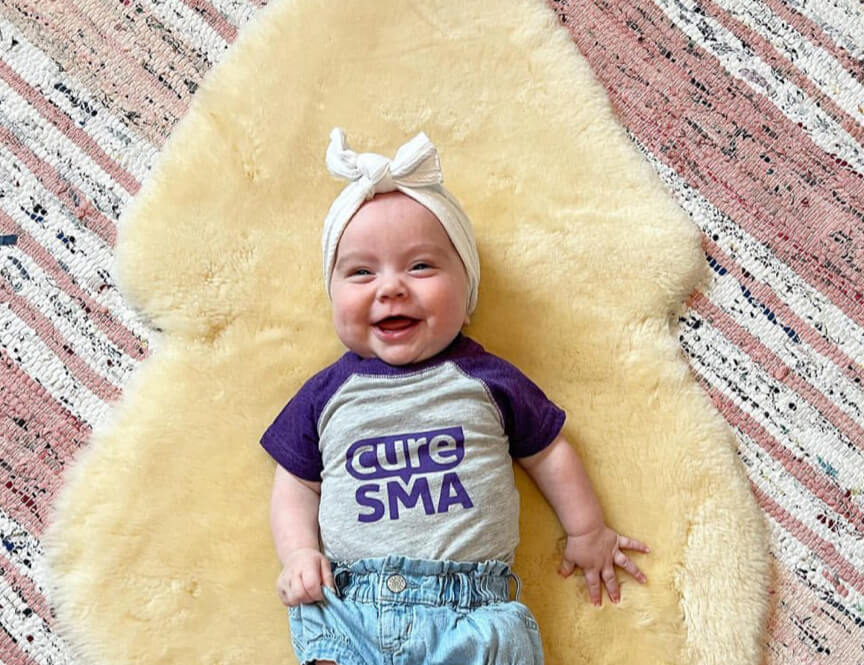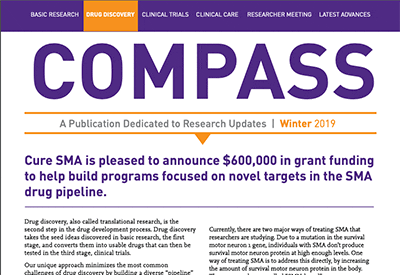Cure SMA has awarded a $140,000 research grant to Christine DiDonato, PhD, Ann & Robert H. Lurie Children’s Hospital of Chicago, for her project, “Skeletal muscle activators as potential modulators of muscular weakness in SMA.”
In SMA, the ability of the muscle to contract is impacted. This proposal focuses on skeletal muscle proteins and their sensitivity to calcium, which impacts their ability to contract and generate force.
Dr. DiDonato and her team will first investigate how proteins in SMA skeletal muscle are mis-regulated. Normal versions of these mis-regulated proteins will be expressed in a mouse model of SMA to determine their effect on the ability of SMA muscle to contract properly.
These studies will allow the team to gain insight into the potential mis-regulation of proteins that may contribute to reduced force production and endurance in SMA muscle, and show how one might benefit from enhancing calcium sensitivity to improve muscle contraction.
This work will have important parallels to the Cytokinetics drug compound, tirasemtiv or CK-107, which works by sensitizing the muscle to calcium to improve contraction and force generation. Ultimately, skeletal muscles activators could foreseeably be used alone or in combination with SMN-inducing drugs to provide enhanced functional benefit to SMA patients.
Meet Dr. DiDonato
Who are you?
I’m a basic science researcher that was born and raised in Akron, Ohio. I now live in Chicago and I’m an Associate Professor in the Department of Pediatrics at the Ann & Robert H. Lurie Children’s Hospital and Northwestern University.
How did you first become involved with SMA research?
I started in SMA research while a PhD graduate student at Ohio State University. At that time the gene responsible for SMA was not known. My thesis project focused on refining the area to search for the SMA causing gene and identify and test candidate genes.
What is your current role in SMA research?
My lab has created a number of mouse models that represent the varying forms of SMA and we are using them and other techniques to understand how SMN functions in both motor neurons and skeletal muscle. We are interested in understanding what the downstream consequences of SMN loss are and finding ways in which we can bypass those problems. Then we are able to perform pre-clinical studies to determine if they can provide functional benefit in our SMA mouse models as a potential for future therapies.
What do you hope to learn from this research project?
We hope to learn how the potential mis-regulation of proteins in SMA skeletal muscle may contribute to reduced force production and endurance and how one might benefit from enhancing calcium sensitivity to improve muscle contraction.
What is the significance of your study?
Currently there is a therapeutic gap in SMA. Many therapeutics increase SMN levels at a time when patients have already lost a significant portion of their motor neurons. This creates a situation where there is enhancement of motor neuron function in the presence of decreased motor neuron input to muscle. We believe greater therapeutic benefit could be achieved by targeting the muscle as well. In this study we will learn about protein mis-regulation in SMA muscle. This will give us important insight into future therapeutic development targeting muscle.
Basic Research Funding
This grant to Dr. DiDonato is part of $1.03 million in new basic research funding that we’re currently announcing. We’re also happy to announce that two additional grants have been added to this round of funding, and we sincerely thank our incredible community and its growing support, which made the extra investment possible.
Basic research is the first step in our comprehensive research model. We fund basic research to investigate the biology and cause of SMA, in order to identify the most effective strategies for drug discovery. We also use this funding to develop tools that facilitate SMA research.



